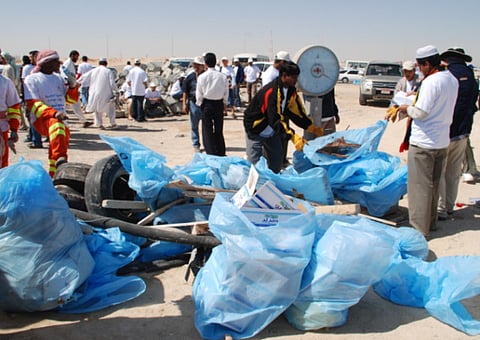Expat NGOs hit by tough registration criteria
Unable to meet strict criteria for registration, most volunteers work in their individual capacities

Abu Dhabi The large majority of expat community and animal welfare groups in the UAE are unable to register with the authorities as they cannot meet the stringent criteria, XPRESS has learnt.
Volunteers and social workers who are widely acknowledged as being the backbone of community welfare and support said they work closely with various government departments and enjoy a high level of credibility, but invariably fall short in getting their organisations registered.
A well-known charity group that had no option but to disband, a popular welfare organisation making a third attempt to get a registration, long-established animal welfare groups still groping for clarity on the rules, friends actively pursuing a cause but have little to officially show for it – the examples are many.
In February 2011, over 50 associations from the Indian community alone attended an event at the Indian Consulate to register with the local authorities. But sources said three years on, only a handful have made it. They said it’s the same story across nationalities.
But as the month of Ramadan has held out, there is no dearth of Good Samaritans in the UAE. Most of them have a strong virtual presence and use social media and word of mouth to mobilise resources and reach out to others.
“We face an identity crisis,” said one volunteer. “Four years ago, a media channel estimated 1,400 voluntary groups existed in the UAE. The number would be higher now. Most are doing good work, but in the absence of a formal registration, there is a sense of discomfort and insecurity.”
The UAE law is stringent when it comes to setting up a charity (see box). Even to set up a non-profit social club the founders have to comply with a lot of paperwork to include details like the reason for its establishment, its bylaws, office-bearers and members and most important, its financial plan, audits and source of funding.
Most expat volunteers fail to meet all of these criteria. A member of a well-known NGO said: “The authorities are very supportive of volunteers and everyone appreciates the work we do, whether it is at the immigration, hospitals, jails or even within the community. But there are too many formalities to complete for registration and that is not easy.”
“We don’t have the money or the infrastructure to function as a registered body,” said a social worker of an unregistered NGO.” We are a transient community where expats come and go, so making a long-term or full-time commitment is difficult.”
But officially recognised groups say it is more a problem of plenty. Anwar Naha, president of the 35-year-old Dubai Kerala Muslim Cultural Centre. which has been registered since 2006, said, “The number of associations doing the same activities from the same communities is high. From what we understand, this is the main reason why there is a bottleneck when it comes to registrations.”
He said voluntary groups undertake a variety of activities but invariably seek social welfare licences.
“But depending on their focus area, it may serve their cause better if they approached different departments to get licences.”
S.P. Singh, president of NGO Welfare of Mankind, which is registered with the Community Development Authority (CDA), said: “Our activities cover three areas - social, sports and music. We hold regular blood donation camps and English classes, supply rations to workers, reach out to those in jail and help repatriate bodies. We operate with 11 core committee members and around 200 other volunteers.”
The rules are far tighter when it comes to charities with any fund-raising initiative. The founder of a disbanded expat charity said: “The only way for people like us to function is to tie up with government-registered charities and pool our expertise.”
Animal welfare groups which rescue and rehome thousands of pets are not clear about the rules.
Pedra Mueller of the Middle East Cat Society which is registered under the World Cat Federation said: “Most animal welfare activists do not know which local authority they should register with. We should have a government body with an expert to oversee volunteers. Otherwise, we will have to deal with so-called rescue groups which despite their good intentions are not equipped to deal with animals.”
Lesley Muncey of Feline Friends agrees. “A few bad apples are corrupting the good work many are doing. We need a proper government-run shelter with trusted animal welfare groups and we need to be guided on how to set up non-profit organisations.”
Sign up for the Daily Briefing
Get the latest news and updates straight to your inbox


